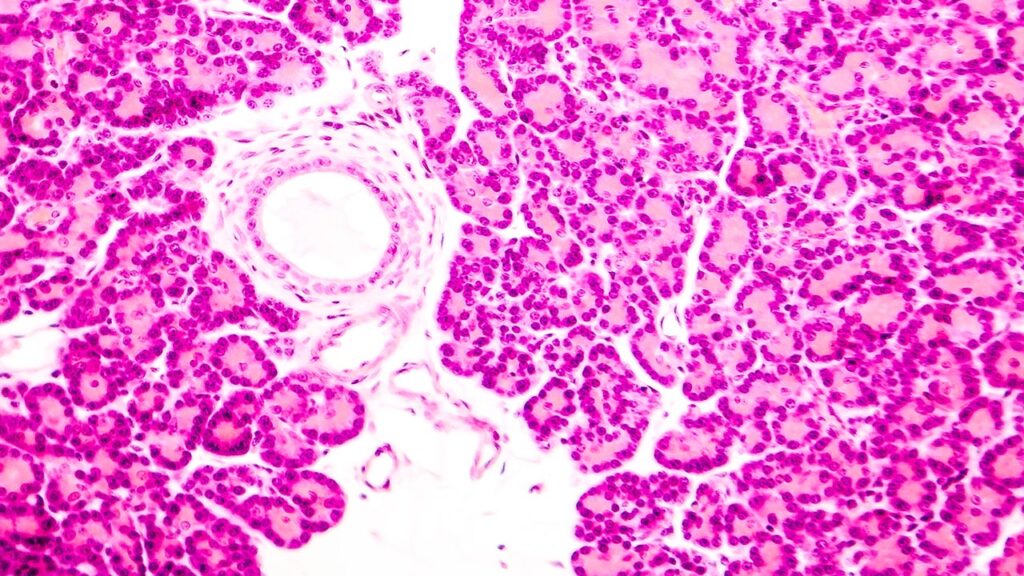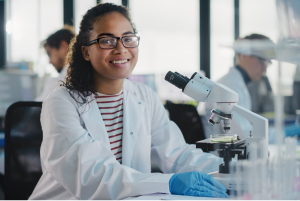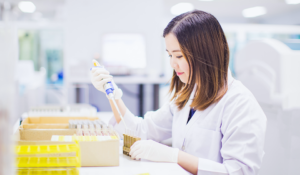
A significant part of JDRF Canada funding goes towards supporting cure-based research for type 1 diabetes (T1D). One such pathway is via stem cell replacement therapies that replace the beta cells responsible for producing insulin killed in the autoimmune process during T1D. The goal is to implant new beta cells that can one day start producing insulin again in a person with T1D, reducing or even eliminating the need for externally administered insulin, either via pump, pen or multiple daily injections. There are two primary sources of insulin producing cells: deceased donor pancreatic cells and human stem-cell derived islets.
In late June 2023, the U.S. Food and Drug Administration (FDA) approved CellTrans’s Lantidra™, the first cell therapy to be authorized in the United States, for use in adults unable to approach average blood glucose levels due to current, repeated episodes of severe low blood glucose (hypoglycemia).
This therapy takes deceased donor islets and places them into people with T1D suffering from repeated severe low blood-sugar, called hypoglycemia, events. This therapy, much like an organ transplant, requires the use of immunosuppression drugs. CellTrans has not provided details on commercial availability or insurance coverage at this time, but it has also currently only been approved for use in the United States.
In other related news, Eli Lilly and Company announced an agreement to acquire Sigilon Therapeutics, a public biopharmaceutical company with whom they had been partnering since 2018 to develop encapsulated islet cell therapies for T1D. These cell therapies include SIG-002, an encapsulated cell therapy that utilizes Afibromer™, a biomaterial designed to protect stem-cell derived insulin-producing cells from the immune system.
Per Lilly, the acquisition is the culmination of years of partnership to develop SIG-002, with Rogerio Vivaldi, M.D., CEO of Sigilon, noting that “Lilly is well-positioned to apply its industry-leading clinical and technical capabilities to harness the full potential of SIG-002 for the benefit of patients and their caregivers.”
Alongside the JDRF T1D Fund, Eli Lilly is also invested in Seraxis, a venture-backed start-up company developing islet replacement cell therapies for T1D.
How can this help people living with T1D?
The development of islet cell therapies is paramount to JDRF’s strategy to develop cures for T1D, and this news speaks to a long history of JDRF support for the academic researchers behind these therapies.
Lantidra, which was developed by CellTrans, is led by José Oberholzer, M.D. He is a JDRFI grantee and a member of the JDRF Cell Replacement Consortium. JDRF has awarded Dr. Oberholzer significant funding since 2006 for his work on stem cell-derived replacement therapies. JDRFI also awarded Daniel Anderson, Ph.D., and Robert Langer, Sc.D., more than $20 million in funding since 2004 to help support the development of Afibromer, the material used in SIG-002.
Lilly’s acquisition of Sigilon is a signal of interest by one of the world’s leading pharmaceutical companies in the development of islet cell therapies—another leading pharmaceutical company working on cures for T1D. This also includes the stem cell-derived islet replacement activities of both Novo Nordisk’s partnership with Aspect Biosystems and Vertex’s positive update at ADA, as well as on the immunology side, Sanofi’s acquisition of Provention Bio.
The FDA’s approval of Lantidra and Lilly’s agreement to acquire Sigilon represent two steps forward in the path to cures.
JDRF Canada is currently pursuing multiple therapeutic approaches to cure T1D, and the T1D Fund has made 37 investments in venture backed companies with T1D programs since its launch in 2016, with over 20 active cures programs in development. With the T1D Fund, JDRF will continue to support and pursue these options to help bring these life-changing therapies to more people faster.




